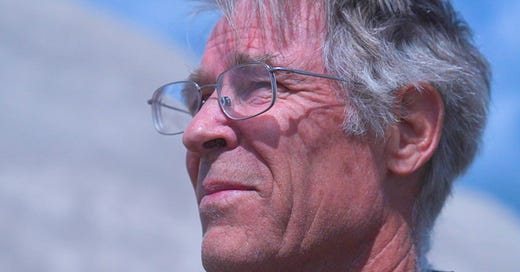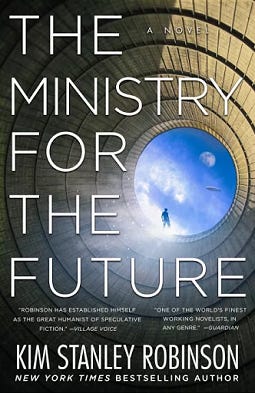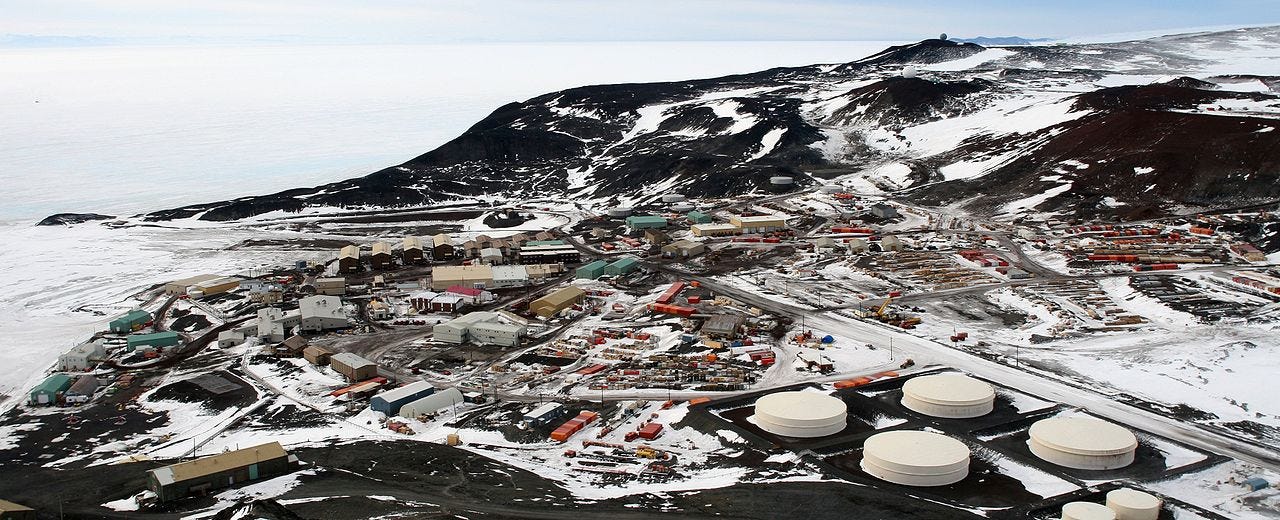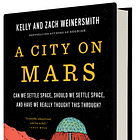Kim Stanley Robinson is one of human civilization’s greatest living science fiction writers. Author of genre-defining works such as the Hugo Award-winning Mars trilogy, The Years of Rice and Salt, Nebula Award-winning 2312, Aurora, and The Ministry for the Future, he was invited to speak at the 2021 UN Climate Change Conference (COP26).
In the interview below, this writer’s questions and comments are in bold, Mr. Robinson’s words are in regular text, and extra clarification (links, etc) added after the interview are in bold italics or footnotes.
Since Ministry for the Future was written, we've seen a couple of things. We've seen China's huge, gigantic exponential renewables build out. We've seen the passage of the Inflation Reduction Act and the consequent doubling of U.S. manufacturing spending, mostly based on clean energy. The International Energy Agency said we might be nearing a global CO2 emissions peak.

I really hope that we're doing better than the timeline of Ministry for the Future and that we can avoid, for example, massive heat death in the Indo-Gangetic Plain, like you wrote about so bone chillingly in the opening of that novel. I am so emotionally invested in this, obviously, that it's hard to tell what is sort of dispassionate analysis and what is like wishful thinking. But I really hope we're doing better than the world of the book. And the world of the book turns out eventually better than you might think at the end.
So what do you think? Are you overall disappointed or relieved to your expectation of the Ministry for the Future world? Do you think we're doing better or worse than that world? I think we’re doing better, but I don't know.
I think better. In fact, for me it's been a kind of intense emotional lightening of the spirit, you might say. I wrote the book in 2019, when Trump was still president and it looked like he might win in 2020. I was angry at that, and I felt like we weren’t moving fast enough as a civilization.
My read on what’s happened since is that the pandemic slapped us in the face with the idea that your life could be disrupted, that you could in fact die, that the biosphere could rise up and change everything. So the culture changed, things speeded up. I've been writing about climate change since the late 90s, and the attitude is completely different now. When I look at the timeline of Ministry for the Future I'm very pleased to report that there are some sentences in it that no longer conform at all to reality as it's going.
“When I look at the timeline of Ministry for the Future I'm very pleased to report that there are some sentences in it that no longer conform at all to reality as it's going.”
-Kim Stanley Robinson
One chapter begins, “the 2030s were zombie years.” And that is now wrong! I think very often science fiction does this: it's really writing about the present, and casts it out into the future to emphasize certain points rather than others. In this case, I think it was the 2010s, or from 2000 to 2020, that were the zombie years, when we knew what we needed to do and we weren't doing it.
If you had been doing your column starting in the year 2000, there still would have been something to fill it every week. But you would have had to hunt for it harder, and many of the good actions would have been precursors, or contested, or embryonic. Now there's more, and it's going so much faster that I think the timeline in Ministry for the Future is completely off. We're already in the ferment that in my novel I have happening in the 2040s.
“I think the timeline in Ministry for the Future is completely off. We're already in the [climate action progress] ferment that in my novel I have happening in the 2040s.”
-Kim Stanley Robinson
That's an amazing acceleration. And I think the acceleration— the feeling of acceleration and the actual acceleration itself— can be spooky or troubling. Nerve-racking. Things are changing so fast you can't possibly keep up with what's happening. You’ve got this enormous inrush of information, most of it coming from all over the world, and then you have to apply a sorting mechanism yourself. This mental sorting action is described in the chapter in Ministry on ideology.
You have an imaginary relationship to the real situation. It's a lens through which you look at the world and see things. It's a sorting mechanism. It's a cognitive map. And you've got to have one, or else you’d be overwhelmed. So you might as well have a positive one, because it’s not like you can exist without one.
“You have an imaginary relationship to the real situation. It's a lens through which you look at the world and you see things. You might as well have a positive one, because it's not like you can exist without one.”
-Kim Stanley Robinson
Speaking ways of visualizing information, I think my favorite part of Ministry for the Future, and I loved all of it, were those chapters in the voice of abstract or non-sentient entities. Those chapters that would have like a really profound description of movement or energy or something, then it would end with, “We are Earth’s herbivores,” or “I am the market,” or “I am a carbon atom.”
I'm sort of tossing around in my head this idea of Lyric Realism. I called it Romantic Realism at first in the sense of Romantic poets, but people thought that meant romance as in, you know, relationships. But, like, Lyric Realism means…the events of real life can be just unbelievably, stirringly epic, in the sense of a great poem, and yet somehow because it's real life, people apply a boredom filter, even when it's incredibly non-boring events. The fact that we are becoming as gods and are determining the composition of the atmosphere with the fate of all the planet's ecosystems in our hands, that is an extraordinary story! And yet somehow there's this filter that people apply, I think just to make it through life, that can make it seem dry and boring just because it is real and because it's not in a novel.
I think part of what your writing does, both generally by writing novels and specifically in extended flights of lyric description like you did in Ministry, is bring back the wonder, the wonder and the terror, of some of the real-world stuff happening. It can seem boring because it's in places like the news or scientific reports, which are boring to many people.
But if you look at it in a narrative form, it is in fact epochal stuff happening.
Does that make any sense?
Yes. Those chapters that are from the point of view of inanimate objects like a photon or the market are in the style of an 18th century genre called the It Narrative. I think it died as a genre because the various “Its” telling their stories don't have agency, and so they're helpless travelers. Eventually people got over the novelty of it, and the genre mostly died. But I wanted it back for a particular purpose.
The Ministry for the Future is a grab bag of genres. Here the great precursor is Moby Dick. Melville’s little essay chapters are quite beautiful, they are the lyric realism you were talking about. Like, “How do you tear the blubber off of a whale?” or “How much danger are those guys in their whaling boats in when they're chasing a whale and the harpoon rope is tangled around them?” That’s the chapter called “The Line,” deservedly famous in that it’s a piercing short story about life itself, staged as a description of ordinary working practice in a quite murderous business.
So I took inspiration from that, and from Dos Passos' USA trilogy, because I knew I wanted a mélange in terms of its form. Partly to provide variety and expansiveness, to show that it's more than just humans who are making a difference on this planet, that we work together with other entities in an actor network—but also to give the novel a bit of fun, because it's a novel about climate change and finance, and needed a bit of fun. And I’ve found that people do tend to enjoy the riddles, the It narratives, the dialogues between the smooth host and the grumpy guest, and most of all, the eyewitness accounts. All these different forms provided extra information, but also extra pleasure.
What are your thoughts on geoengineering? Because that's sort of a loaded term. Maybe most common use of the term is, you know, sulfur in the stratosphere, a new Pinatubo, like Neal Stephenson explored in Termination Shock, but there's so many other options.
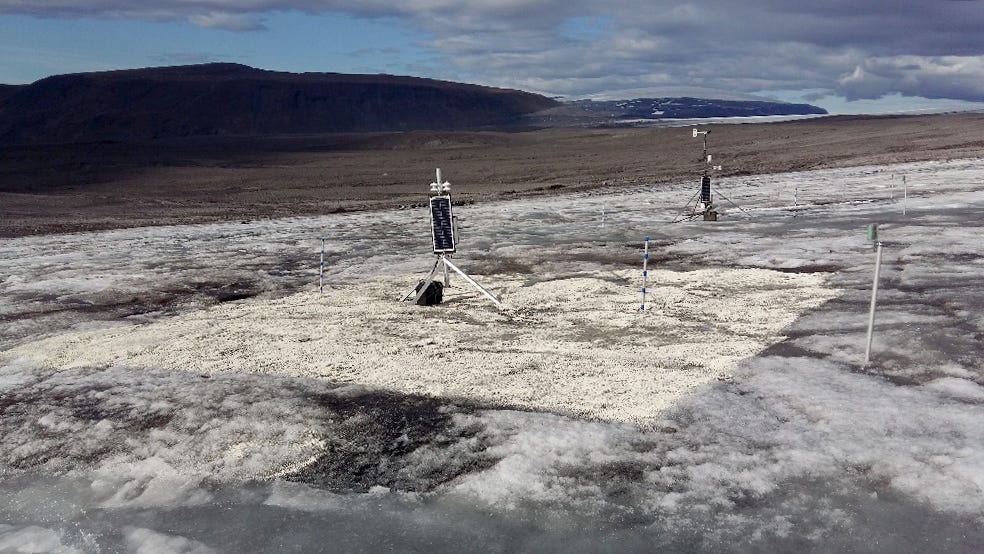
Like, you wrote about potentially tinting the waters of the Arctic Ocean a lighter albedo color in Ministry for the Future. And I've actually talked a lot, did an interview, with a group called the Bright Ice Initiative. They’re testing localized albedo enhancement with hollow glass microspheres, non-toxic silica, in Iceland and the Himalayas. They did a trial in Iceland just last summer. So I'm leaning towards thinking that smart, localized, reversible geoengineering, not a one-shot global roll of the dice experiment like sulfur in the stratosphere, might be a really valuable tool in managing the Anthropocene.
So what are your thoughts on geoengineering, given you've explored fictional versions of that?
Well, I have been thinking about it and trying to learn about it, and I've been talking about it across the board with interested parties. One thing I try to say to people, because you did bring up these smaller localized efforts that are modular and reversible, is that geoengineering is too big of a term. You can't talk about geoengineering without getting instantly confused, because we already geoengineered the hell out of this planet ever since we started agriculture, if not before. So to object to it now because there might be secondary effects, especially given the emergency, is not really the main issue.
Also, the name itself is now a red flag. The name, in my crowd, is instantly a sign of bad intent. And that's not useful, because we might end up deciding to do some of these things on purpose, as giving us a better chance of avoiding a mass extinction event.
“You can't talk about geoengineering without getting instantly confused, because we already geoengineered the hell out of this planet ever since we started agriculture, if not before.”
-Kim Stanley Robinson
Here's an analogy that has been given to me by others. The earth is sick. It's got a temperature. It's got a fever. I would call this fever the CO2 overshoot. There's too much CO2 in the atmosphere, and we're going to take decades to pull it down. You don't want to call that pulling it down geoengineering, even though it is by some definition.
Yeah, exactly.
So now, in common usage, geoengineering bundles together too many different proposed methodologies, which each have different strengths and weaknesses.
The modular methods are modular, local, and reversible, and some of them might draw down a lot of carbon without much risk associated with them. Because of the CO2 overshoot, we're going to want to investigate every single method.
But say you're talking about tools and you say, we've got an axe, we've got a hammer, we've got a drill, and we've got an atomic bomb. Well, people pay attention to the atomic bomb! They say, “Holy shit, that one sounds serious, tell me more.” And then they forget about the hammer and the drill and the ax and the saw.
They might even say, “Let's ban tools, they're too dangerous!”
Yes, exactly! But, solar radiation management, which usually refers to casting some aerosols into the very high stratosphere to bounce some sunlight away—that’s global, and carries some risks. So, the people who are studying solar radiation management usually acknowledge this. They say yeah, yeah, we get it, and the modular is all well and good, but it's SRM that would work the best for the least amount of money, and it might turn out to be an overarching mitigation with very little downside. So let's study it too, along with the rest of the proposals: and don't freak out before you know the full story.
I think that's worth thinking about. Then the main question concerning solar radiation management is governance. In my novel, India does it unilaterally. You could also postulate an independent billionaire doing it, as in Neal Stephenson's novel. It's pretty simple to do. But what's the real governance going to be? How would we decide to do it? That's where people are beginning to work. There are people trying to convince the UN to talk about it. The OECD is talking about it, mainly about the governance issues, and in general, the discussion is growing.
There was that company in Mexico. They just sent up a weather balloon with a can of sulfur. That was kind of a gimmick, not at a serious scale.
That was absolutely a gimmick. It was like a physical form of a bad cryptocurrency.
I’ve been working with a group of glaciologists who are trying to investigate the possibilities of that thing I described in Ministry, sucking water out from underneath the big glaciers in Antarctica and seeing if that slows them down so they don't slide into the sea and melt. It’s a legitimate idea, and there too, they're saying, well, what about governance? We’d need to go to the Scientific Committee for Antarctic Research, SCAR. We'd need to go to NSF, and to the UN. Breaking into the bottom of these big glaciers is a biological contamination issue. When there are lakes down there underneath, we've tried to keep those clean when we break into them, at least when it seems like they might be very old.
So that is one of those modular, reversible, and localized methods that I’m tracking. This is one of the few cases where I'm actually on the cutting edge, because I went to the first meeting of these glaciologists, which was super interesting. I'm writing a non-fiction book about Antarctica, and that particular story will not be over, in fact it'll be barely begun, when I publish this book.
Well, I would love to read it and review it when it comes out. I didn't know this. I don't think I've seen any news articles about this.
No, it's my current project. I’ll turn it in in July, I'm writing it now. It's structured like my book The High Sierra: A Love Story— the same format, in that it will have a variety of modes, including lyric realism as you called it, memoir, history, geology, and this case, glaciology. I'm enjoying this kind of modular miscellany, or just the kitchen sink principle— just throw in everything. It helps me to do non-fiction.
Really? You’ve written so many great novels!
Thanks. I love novels with all my heart. It's what I've devoted my life to. But after Ministry, I don't know what fiction to write next. So these nonfiction books fill a gap. They are a way of keeping my hand in the game while I try to collect myself for another novel.
Fascinating.
You know, I'm sure you've come across this in your research for the book, but one bit of news I came across that really struck me as like something from one of your novels was that a peer-reviewed study found recently that a new Antarctican accent of English appears to be forming in some of the international research communities down there.
And that just seemed very Kim Stanley Robinson.
Yes, I saw that. To me it's pushing the edge of the definition of an accent too hard. It's not an accent, it’s not a dialect. It's a particular working vocabulary.
Any small town or technical community—you could go to a scientific lab for instance— and you'd find them speaking an English in there that was tweaked by their material existence, which is to say what they were doing and the tools they were using. To me that's not a new dialect, or an accent. It's just a very small community. I mean, McMurdo is really like a small town in Maine. And there are a lot of Mainers down there.
In the winter, it's a maintenance crew, quite bizarre, like a spaceship, with around 200 people. But in the summer, it's a 2,000-person small town. And it requires people who know how to do plumbing and construction and electrical work, so it has the trades. It also has people who are General Field Assistants, the GFAs, they call them Good For Anything. Those people are there to sweep and clean up and do the dishes. And there are, of course, cooks, and everyone else you need to run a small town. They have to hire people to run that town. About half the summer population are keeping the town going, and the other half are scientists who are there to be springboarded off into the backcountry to do their research.
It's a great little town. I loved it. I spent time there in 2016 and time there in 1995, and I saw why some people get addicted to it. They like face-to-face small town life. They like knowing everybody. And they like the landscape. So there are many people, mostly Americans, who are spending their Northern summers in Alaska or in Maine or the like, working in the trades and driving bulldozers or doing carpentry, and then they spend the Northern winters down there in McMurdo, during the Southern summers. Some of them hardly ever see darkness. They go Alaska to Antarctica. It's interesting.
I would love to visit Antarctica someday. I would love to go and write about the amazing work being done now.
Well, you know, you can. The media pass to Antarctica through NSF is way easier to get than the artist pass. I don't know what NSF thinks of doing your own Substack, but yours is so great, I’m sure they would like it. It used to be the case, if you had a commission from a magazine or a newspaper they thought was important enough, they would simply send you down. Now they might get it that your Substack is important because of what it does.
That's awesome. I'll very much look into that.
Well, moving on, I wrote a review recently of a book called A City on Mars by the Wienersmiths that focused on the economic and social and legal aspects, not the technical aspects, of potential space colonization and space settlement.
The space economy is booming hugely with Starlink and the James Webb Space Telescope and a bunch of other stuff. But they made a case that even with as much cool stuff as we can do in space in the near future, we're really unlikely to live there this century, because it's just going to be really, really, really economically difficult, and we haven't cracked small-scale self-sustaining biospheres yet.
They just made a case that seemed to say that, you know, the 2312 future, which is my favorite of your books, with the asteroid terraria and the colonies throughout the solar system, seems further off than previously thought. And, you know, that's a bit sad, a bit disappointing. But they also said, maybe space is like building a cathedral. Maybe you just go based on space because it's cool, even if there's no strong economic incentive to build a colony on Mars. Maybe it's just worth doing intrinsically.
So what do you think? You've obviously written some of the most in-depth descriptions of solar system colonization in the literature. What do you currently think, given the advances in reusable rockets and other stuff? What do you think the future of human space colonization will look like in our timeline?
Full interview with Kim Stanley Robinson is available for paid subscribers!
Keep reading with a 7-day free trial
Subscribe to The Weekly Anthropocene to keep reading this post and get 7 days of free access to the full post archives.

